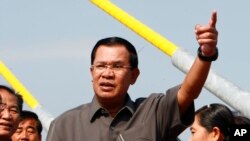Cambodia’s ruling party suffered a dramatic drop in support during the country’s last election two years ago, and critics say lawmakers are now pushing through a spate of laws to ensure that does not happen again. In the past year, parliament has passed new regulations for the judiciary, elections, and non-governmental organizations, and more measures targeting trade unions and the Internet are on the way.
The fear is that the three controversial laws passed by Cambodia’s parliament in recent weeks – and the likely passage of another two in the coming months – will be misused by the ruling party ahead of the 2018 general election to stifle dissent and reinforce its hold on power.
The wave of legislation follows the shock result in the 2013 election, which the opposition came close to winning.
The most recent of these laws – the vaguely worded Law on Associations and Non-Governmental Organizations, or LANGO – gives the government wide powers to shut any non-profit or association that fails to meet stringent registration and reporting requirements, or that endangers peace, national unity or culture.
The government claims the law will prevent terrorism and money laundering.
The LANGO is deeply controversial. The European Union, the United Nations and the United States, all key development partners, have all spoken out against. It. Hundreds of non-profits have called for the LANGO to be scrapped.
That looks unlikely – the LANGO is awaiting ratification in the Senate, scheduled for Friday. Opposition senators say they’ll boycott the vote, but as they’re in a minority that won’t make much difference.
Ou Virak, a political analyst and founder of local think-tank The Future Forum, said the flurry of legislative activity is Prime Minister Hun Sen preparing for the 2018 polls.
“The government has made it clear that they are upset with the NGOs, and particularly NGOs who have been political, who have been talking about the election results, who have been complaining about the lack of free and fair elections in the past – particularly the protests that ensued after the 2013 disputed election,” said Virak.
Virak said the ruling Cambodian People’s Party, or CPP, regards many NGOs as pro-opposition. As bad, in its eyes: many NGOs are funded by foreign governments, and that plays to Hun Sen’s fears of an Arab Spring-style uprising against his three decade-long strongman rule.
Other laws are also on the way: one will regulate trades unions, many of which support the opposition.
And, given the boost the opposition received from social media ahead of the 2013 vote, few are surprised that an internet law, ostensibly to target cyber-crime, is also in the works.
Virak said that because social media sites such as Facebook and YouTube have become a popular way for Cambodian youth to vent their anger over sensitive political issues, government action on that front is now much more likely.
“I wouldn’t be surprised if the internet freedom, or cybercrime, will be used as a scapegoat to try to reel in another medium that could undermine the grip of the ruling party – and that is the internet,” he said.
Other analysts agree that the laws form part of the CPP’s preparations ahead of the next election. Among them is journalist and author Sebastian Strangio, whose recently-published book Hun Sen’s Cambodia covers the country’s political development since 1979.
The passage of the LANGO, Strangio said, indicates something more deep-rooted: a settling of scores with civil society, a sector the ruling party has viewed with deep suspicion since the U.N.-backed elections in 1993.
“And I think that in the 2013 election, and indeed in the two decades since the UN mission, the CPP has seen civil society as a fifth column for hostile Western powers – they’ve been paranoid about this force. And so this law, I think, is a way – not of eliminating civil society entirely – but of giving themselves a tool with which to enforce the narrowing limits that they have established,” said Strangio.
The government insists such worries are misplaced. Deputy Prime Minister Sar Kheng said last week people ought not to fear it would misuse the LANGO.
But the executive, which exercises full control over the judiciary, has a long history of doing just that with other laws.
On Tuesday, for example, the municipal court in Phnom Penh jailed 11 opposition supporters for up to 20 years on charges of insurrection. Their crime? To be present at a post-election protest in the capital last year that turned violent. Rights groups called the verdict “absurd.”







